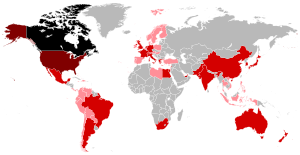
Back كنديون Arabic كاناديين ARZ কানাডীয় Bengali/Bangla Kanaďané Czech Καναδοί Greek Kanadanoj Esperanto Canadienses Spanish Kanadalased Estonian کاناداییها Persian Canadiens (peuple) French
 | |
| Total population | |
|---|---|
| Canada: 41,465,298 (Q4 2024)[1] Ethnic origins:[2][3]
| |
| Regions with significant populations | |
 | |
| United States | 1,062,640[5] |
| Hong Kong | 300,000[5] |
| United Kingdom | 73,000[5] |
| France | 60,000[6] |
| Lebanon | 45,000[5] |
| United Arab Emirates | 40,000[7] |
| Italy | 30,000[8] |
| Pakistan | 30,000[9] |
| Australia | 27,289[5] |
| China | 19,990[5] |
| Germany | 15,750[10] |
| South Korea | 14,210[5] |
| Japan | 11,016[5] |
| Languages | |
| Religion | |
Religions of Canada[11]
| |
Canadians (French: Canadiens) are people identified with the country of Canada. This connection may be residential, legal, historical or cultural. For most Canadians, many (or all) of these connections exist and are collectively the source of their being Canadian.
Canada is a multilingual and multicultural society home to people of groups of many different ethnic, religious, and national origins, with the majority of the population made up of Old World immigrants and their descendants. Following the initial period of French and then the much larger British colonization, different waves (or peaks) of immigration and settlement of non-indigenous peoples took place over the course of nearly two centuries and continue today. Elements of Indigenous, French, British, and more recent immigrant customs, languages, and religions have combined to form the culture of Canada, and thus a Canadian identity. Canada has also been strongly influenced by its linguistic, geographic, and economic neighbour—the United States.
Canadian independence from the United Kingdom grew gradually over the course of many years following the formation of the Canadian Confederation in 1867. The First and Second World Wars, in particular, gave rise to a desire among Canadians to have their country recognized as a fully-fledged, sovereign state, with a distinct citizenship. Legislative independence was established with the passage of the Statute of Westminster, 1931, the Canadian Citizenship Act, 1946, took effect on January 1, 1947, and full sovereignty was achieved with the patriation of the constitution in 1982. Canada's nationality law closely mirrored that of the United Kingdom. Legislation since the mid-20th century represents Canadians' commitment to multilateralism and socioeconomic development.
- ^ Statistics Canada (September 29, 2021). "Population estimates, quarterly". www150.statcan.gc.ca. Government of Canada. Archived from the original on June 14, 2018.
- ^ Government of Canada, Statistics Canada (October 26, 2022). "The Canadian census: A rich portrait of the country's religious and ethnocultural diversity". www12.statcan.gc.ca. Retrieved October 26, 2022.
In 2021, just over 25 million people reported being White in the census, representing close to 70% of the total Canadian population. The vast majority reported being White only, while 2.4% also reported one or more other racialized groups.
- ^ Government of Canada, Statistics Canada (October 26, 2022). "Visible minority and population group by generation status: Canada, provinces and territories, census metropolitan areas and census agglomerations with parts". www12.statcan.gc.ca. Retrieved October 26, 2022.
- ^ Government of Canada, Statistics Canada (October 26, 2022). "The Canadian census: A rich portrait of the country's religious and ethnocultural diversity". www12.statcan.gc.ca. Retrieved October 26, 2022.
- ^ a b c d e f g h "Canadians Abroad: Canada's Global Asset" (PDF). Asia Pacific Foundation of Canada. 2011. p. 12. Retrieved September 23, 2013.
- ^ "Relations bilatérales du Canada et France". France Diplomatie : : Ministère de l'Europe et des Affaires étrangères. Archived from the original on March 4, 2016. Retrieved January 4, 2023.
- ^ "Canada may limit services for dual citizens". Gulf News. January 15, 2014. Retrieved July 12, 2015.
- ^ "Global Migration Map: Origins and Destinations, 1990–2017". Pew Research Center's Global Attitudes Project. February 28, 2018. Retrieved October 3, 2021.
- ^ Hasan, Shazia (August 20, 2019). "HC highlights growing ties between Canada, Pakistan". Dawn. Archived from the original on August 20, 2019. Retrieved November 24, 2022.
Meanwhile, there are some 30,000 to 50,000 Canadians in Pakistan
- ^ "Ausländeranteil in Deutschland bis 2018". Statista.
- ^ a b "Census Profile, 2021 Census of Population Profile table". Statistics Canada. February 9, 2022.
Cite error: There are <ref group=lower-alpha> tags or {{efn}} templates on this page, but the references will not show without a {{reflist|group=lower-alpha}} template or {{notelist}} template (see the help page).